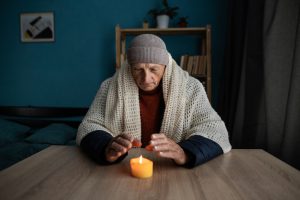
Older adults are more sensitive to colder temperatures and must take special care in winter weather conditions.
Senior Living Apartments in San Antonio Without Heat During Winter Storm
According to a San Antonio Express-News report, a senior living apartment was left without heat during the cold front last month.
As temperatures fell well below freezing during the week of January 17th, 2024, 16 apartment units in the Wheatly Park Senior Living Center were left without heat. Residents were reportedly forced to use small space heaters to keep warm, and one resident called 311 for help. Residents had previously sent a petition to the apartment manager after the HVAC went out during the record heat in the summer months, but management did nothing to fix the problem. No injuries were reported as a result, and city inspectors came to check on the apartments without heating.
Did You Know?
Hypothermia in older adults can increase their risk for heart disease and kidney and liver damage.
Cold Weather Safety for Older Adults in San Antonio
As we age, our bodies become more sensitive and require more care to remain healthy. Older adults are more sensitive to cold weather and can become seriously sick if not kept warm.
If senior care centers neglect to keep their residents warm, they can become seriously sick or even die as a result.
Medical Conditions and Their Impact During Winter Weather
Falling on slick ice is always a risk for older adults, but there are other ways they can become sick or injured in cold weather conditions in San Antonio.
Certain medical conditions common in aging adults can make it more difficult to stay warm, like:
- Thyroid Problems — affect the body’s ability to regulate temperature.
- Parkinson’s Disease/Arthritis — can make dressing in warm clothes or using blankets more difficult.
- Diabetes — affects normal blood flow, making it more difficult to keep warm.
- Memory Loss — can make it difficult to remember to prepare for winter weather conditions properly.
Additionally, medications for common medical conditions, either over-the-counter or prescription, can affect body temperature. Make sure to ask your doctor about how your medications may affect your body temperature.
Cold Weather Exposure Risks for Older Adults
If a senior citizen is exposed to cold temperatures for too long, they can contract hypothermia or frostbite.
Frostbite
Frostbite is a skin injury resulting from being exposed to below-freezing temperatures. Older adults are at greater risk for frostbite due to poor blood circulation. Exposed skin will change color and lose feeling, most commonly in the hands, feet, nose, and ears.
Hypothermia
Hypothermia occurs when your body temperature drops below 95°F. Hypothermia is particularly dangerous for older adults who can contract it in temperatures below 68°F, especially if they take medications or have chronic conditions. It also affects the brain, making it hard to think clearly or move to help yourself. Symptoms of hypothermia include:
- Cold feet and hands
- Puffy or swollen face
- Pale skin
- Shivering or shaking
- Slowed or slurred speech
- Feeling sleepy, angry, or confused.
If you suspect someone has hypothermia, call 9-1-1 and cover the person in warm, dry blankets.
Have Your Elderly Parents Suffered Hypothermia or Frostbite in an Assisted Living Center? Call Carabin Shaw.
Assisted living facilities in San Antonio have a responsibility to keep their residents safe and healthy. If your loved one suffered an extreme cold injury in an assisted living center, you may have grounds for a lawsuit.
Carabin Shaw has served those injured in senior living centers in San Antonio for 30 years, and we put our clients first. Call the team that cares today at 800-862-1260 or use the live chat at the bottom right of your screen. We look forward to serving you.
²CDC Information on Hypothermia Risks
 Texas Accident & Injury News
Texas Accident & Injury News

